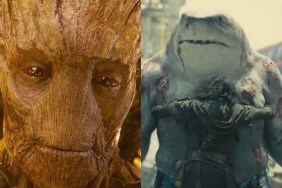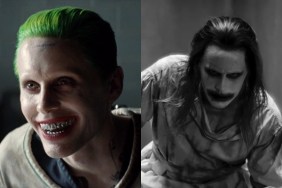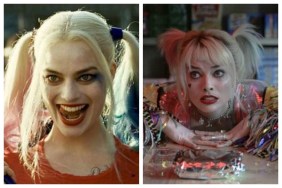We’ve come a long way, baby, since superhero movies were mostly just middling action films with more emphasis on theatrics than characters. The genre seems eager now to explore what it really means to be a hero, and what the ramifications of that would be, and how these exploits might meaningfully reflect on real-life situations that matter to the audience.
And then something like Suicide Squad comes along and dinks that whole thing up. David Ayer’s film shoves a bunch of stock character types into a stock plot line and trudges towards a stock conclusion. The fundamental idea of the film is great – supervillains forced to do a good deed, Dirty Dozen-style – but it plays out generically, with our bad guys only allowed to express themselves in flashbacks, before getting shoved into a series of mediocre, choppy action sequences for the whole second half of the movie. Most of the cast barely talks to each other, and none of the characters seem to change over the course of the film, making the whole experience seem unnecessary and forgettable.

Warner Bros.
Also: What’s the Best Supervillain Movie Ever…?
We meet the villains of Suicide Squad in the prologue. Then we meet them again as Amanda Waller (Viola Davis) pitches the “Suicide Squad” idea to her bosses. Then we meet them all again as she pitches that idea to THEIR bosses. Then we meet them all again as Amanda Waller visits the villains in prison. Then we meet them all again as they are taken out of prison. Then we meet them all again as they suit up to go on their mission. Then we meet two new characters that the movie seemed to have forgotten to introduce until the last minute. It takes nearly an hour for the story to get started because Suicide Squad thinks we need three or four scenes of pure exposition just to get the general idea across that Will Smith is playing a hitman.
The squad consists of Deadshot (Will Smith), Harley Quinn (Margot Robbie), Diablo (Jay Hernandez), Captain Boomerang (Jai Courtney), Killer Croc (Adewale Akinnuoye-Agbaje), Rick Flag (Joel Kinnaman), Slipknot (Adam Beach), Katana (Karen Fukuhara) and Enchantress (Cara Delevingne). They have to team up when Enchantress breaks out and opens a swirling knick-knack vortex of death over a major metropolitan area. She also breaks her evil brother out of his Russian nesting doll prison and together they turn helpless bystanders into faceless paste monsters. It’s the sort of vague and emotionally meaningless villain plot that we’ve seen before in bland and/or awful superhero movies like Thor: The Dark World and the latest Fantastic Four reboot, and Suicide Squad doesn’t do it any better.

Warner Bros.
The majority of the screen time goes to Will Smith, whose character is an assassin who doesn’t shoot women or children (which makes it okay apparently), and Margot Robbie, who is presented here as The Joker’s loyal minion. At one point, thanks to the power of magic, we see that Harley Quinn’s deepest desire is to be a 1950s housewife, married to The Joker, who has been cured of his psychotic tendencies. It’s hard not to interpret Harley Quinn’s portrayal in Suicide Squad as a serious regression for this character, putting a woman who has fought to build her own identity in the comics back into a subservient position and resisting every opportunity to give her a chance to grow out of it. Harley Quinn is obviously supposed to be Suicide Squad’s breakout character. How odd, then, that the movie seems so eager to keep her in a corner.
The Joker, played by Jared Leto as a more organized version of Alien from Spring Breakers, has a lot less to do with Suicide Squad than the marketing would have you believe. He’s a spoiler here, popping up in flashbacks to explain Harley Quinn’s backstory and then once again a little later, just to make Suicide Squad feel like a part of a larger universe instead of a completely isolated incident. His is a decent new interpretation of the character, but maybe Suicide Squad would have been more entertaining if The Joker had something to actually do instead of just popping in and out of the story like Tuxedo Mask in an old Sailor Moon episode.

Warner Bros.A go
Also: Why Jared Leto’s Joker is the Joker We Need
Suicide Squad takes an interminable amount of time to get started, and once it starts, it lumbers. Even a great idea and a wonderful cast can’t fend off a serious case of the blahs. We don’t get to know most of these people, and when we do get to know them we usually find out that they’re less interesting than they should be. The action is meaningless and hard to see thanks to all the awkward editing and mirky cinematography. The jokes mostly fall flat. The bad guys (as in, the ones the other bad guys are trying to stop) come across like Power Rangers villains. We should be expecting more from our entertainment.
It’s not hard to watch Suicide Squad, but that doesn’t mean it’s worth watching. It would be nice to think that our collective standards are higher than this now. Sure, it’s better than Batman v Superman but that’s a backhanded compliment, and I mean it with a firm backhand. Suicide Squad feels 20 years behind the curve. If this movie had come out in the late 1990s, when its biggest superhero movie competition was uncomplicated action flicks like Batman Forever and Blade, it would have seemed like a breath of fresh air. Now it’s just stale.
Correction: This original review previously cited Thor: Ragnarok instead of Thor: The Dark World. We apologize for the error and the confusion.
William Bibbiani (everyone calls him ‘Bibbs’) is Crave’s film content editor and critic. You can hear him every week on The B-Movies Podcast and Canceled Too Soon, and watch him on the weekly YouTube series Most Craved, Rapid Reviews and What the Flick. Follow his rantings on Twitter at @WilliamBibbiani.
The Best Supervillains Who Haven’t Been in a Movie Yet:
Top Photo: Warner Bros.
The Best Supervillains Who Haven't Been In A Movie Yet
-
Annihilus

This old Fantastic Four villain reinvented himself in 2006 when he damn near conquered the universe, and inadvertently brought the all-new, all-different Guardians of the Galaxy (a.k.a. the version everyone currently knows and loves) together in the first place. He's big, he's powerful, he looks scary as hell, he totally deserves a badass name like "Annihilus."
Photo: Marvel
-
Anti Monitor

The all-powerful Anti-Monitor (whose name only makes sense with a LOT of context) destroyed an almost infinite number of universes, forcing the entire DC comic book line to reboot itself in the 1980s. Bad guys don't get much badder than this.
Photo: DC
-
Bizarro

In some stories Bizarro is a failed clone of Superman, in others he's from a "bizarro" planet in which everything is the opposite of Earth. Either way, he's just as powerful as the Man of Steel and dangerously deranged, making him one of Superman's most popular villains for many years.
Photo: DC
-
Brainiac

Another one of Superman's most popular bad guys, Brainiac is an alien android (in some versions, just an alien) obsessed with collecting intelligence from the around the universe. Some storylines claim he is directly responsible for the destruction of Krypton, others depict him as a destructive force that eliminates whole planets after he's learned everything about them.
Photo: DC
-
Cassandra Nova

Cassandra Nova is Charles Xavier's twin sister (sort of), who escaped from the womb and became the mirror image of everything he stood for. Professor X tried to bring about a new age of peace between mankind and mutants. Cassandra Nova was responsible for a genocide that left 16 million mutants dead.
Photo: Marvel
-
Clayface

There aren't many popular Batman villains who haven't shown up in theaters yet, but Clayface is easily the most prominent. An actor who fell victim to a toxic substance that melted him into clay, but gave him the ability to shapeshift into different people and deadly objects, Clayface is one of Caped Crusader's most powerful foes.
Photo: DC
-
Kang the Conqueror

Kang the Conqueror is a little bit complicated, but time travel will do that to you. Basically he's a descendant of Reed Richards from the future, who became a time-hopping despot, who also became a more wizened villain named Immortus later in life, but thanks to time travel they sometimes work together. He's an ambitious villain, but the possibilities are inherently endless.
Photo: Marvel
-
Kraven the Hunter

A lot of Spider-Man villains have animal powers (so does Spider-Man, obviously), so a big game hunter was always a natural fit. Kraven the Hunter may seem like a gimmick villain but his obsessive need to prove his superiority to Spider-Man eventually led to one of the hero's best and darkest storylines, Kraven's Last Hunt.
Photo: Marvel
-
Metallo

Warner Bros.' obsession with Lex Luthor and General Zod has left a lot of Superman's best villains on the cutting room floor. Here's another one: Metallo, a criminal trapped inside a powerful metal body, whose ability to rebuild himself - and his kryptonite battery core - has made him one of the Man of Steel's most formidable foes.
Photo: DC
-
M.O.D.O.K.

He's a big head with little arms and legs, and he's "Designed Only for Killing." This is M.O.D.O.K., one of Captain America's strangest and most unforgettable villains, who uses his mental powers to lead an army of evil super scientists.
Photo: Marvel
-
Mr. Mxyzptlk

This hard-to-pronounce villain (here goes: 'Mix-YEZ-pit-lick") is an all-powerful prankster deity from Dimension X, who routinely pops into Superman's life to stir up mischief. But Mr. Mxyzptlk is more than a joke character, he's been the cause of major strife in the DC universe on multiple occasions and, in a classic story by Alan Moore, revealed himself to be one of Superman's most dangerous adversaries.
Photo: DC
-
The Phalanx

One of the most fearsome alien races in all of comics, the Technarh are "techno-organic," alive but made of machinery, with the ability to transform themselves and infect other races. They formed The Phalanx and helped conquer the universe with Ultron as their leader, and proved themselves one of the most visually interesting and formidable threats in the Marvel universe.
Photo: Marvel
-
Sinestro

Sinestro technically appeared in the live-action Green Lantern movie, but only as a hero, not as a villain. Once the most celebrated hero of the Green Lantern Corps, he eventually was revealed to be a corrupt influence, and went on to form his own army of Yellow Lanterns, who used their powers to instill fear across the galaxy.
Photo: DC
-
The Skrulls

Another mighty alien race, The Skrulls are a species of shapeshifters who have repeatedly infiltrated the ranks of Marvel's heroes in an attempt to conquer our planet. In the epic crossover event Secret Invasion, they came shockingly close.
Photo: Marvel
-
Thunderbolts

Nowadays the Thunderbolts are a group of supervillains employed by the government, not unlike the Suicide Squad. But when they first premiered they had one of the cleverest ideas in comic book history: they impersonated a new team of superheroes, and defeated their fair share of other supervillains, to earn the world's trust. Then, when the time was right, they revealed their secret identities and took over the planet! Lots of these villains deserve to be the bad guy in a superhero movie, but that's such a clever idea that the Thunderbolts probably deserve their own film.
Photo: Marvel








